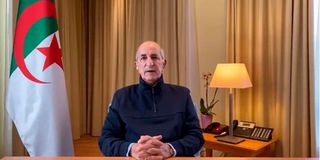Algeria Cabinet resigns following parliamentary elections results

An image grab taken from a video published on the personal twitter account of Algeria's President Abdelmadjid Tebboune on December 13, 2020 shows him delivering a speech to a camera next to an Algerian flag.
What you need to know:
- President Tebboune requested Djerad and his team to stay in office until a new government is formed.
Algiers,
Algerian Prime Minister Abdelaziz Djerad and members of his cabinet on Thursday presented their resignation to President Abdelmadjid Tebboune, the state run television ENTV reported.
According to the Article 113 of the Constitution, the Cabinet resigns after the confirmation of the final results of parliamentary elections.
Thus, the resignation of Djerad Cabinet comes after the announcement of the final results of the June 12 parliamentary elections by the Constitutional Court late on Wednesday.
The Constitution also stipulates in its Article 103 that the government is headed by a Prime Minister when the legislative elections result in a pro-president majority, and by a head of government when the elections result in an opposition party majority.
President Tebboune requested Djerad and his team to stay in office until a new government is formed.
Late on Wednesday, the Constitutional Council announced that the National Liberation Front (FLN), grabbed 98 seats out of 407 seats at the lower House of Parliament, and the independent list candidates collected 84 seats, while the Islamist oriented Movement of Society for Peace (MSP) collected 65 seats, followed by the former ruling party of the National Democratic Rally (RND) with 58 seats.
The pro-regime party of El Moustakbal Front gathered 48 seats while the Islamist oriented El Binaa Movement got 39 seats.
The rest of 15 seats were shared by minor political parties.
These results has drawn a remarkable change in the political landscape in the North African nation, for it is the first time that independent candidates become the second power at Parliament since the introduction of multi-party system in 1989.
On February 18, Tebboune dissolved the lower house of the Parliament and announced early elections that were held on June 12.
The outgoing Parliament was dominated by the former ruling parties, namely the National Liberation Front (FLN) and the National Democratic Rally (RND), while the Islamists constituted the major opposition force.





